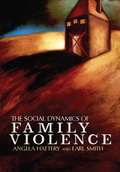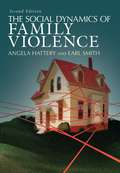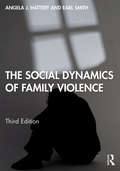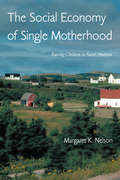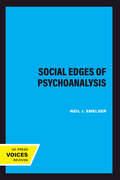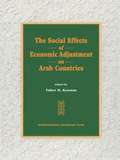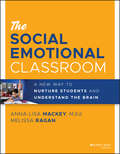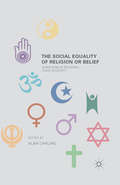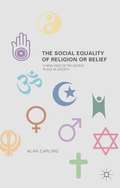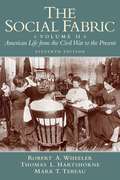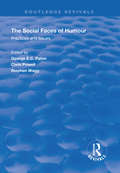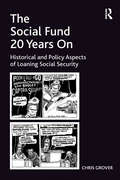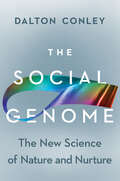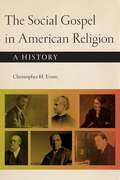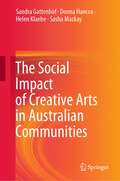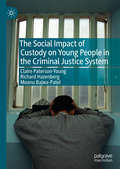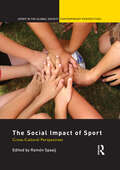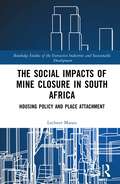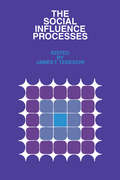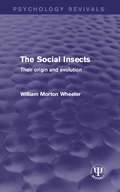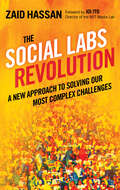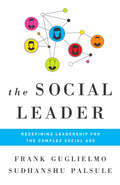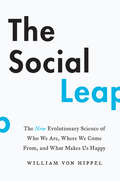- Table View
- List View
The Social Dynamics of Family Violence
by Angela Hattery Earl SmithThis compelling new text explores family violence throughout the life course, with special attention to the social character and institutional causes of family violence. From child abuse and neglect to intimate partner violence and elder abuse, Hattery and Smith ask students to consider how social inequality, especially gender inequality, contributes to tensions and explosive tendencies in family settings. Students learn about individual preventative measures and are also invited to question the justice of our current social structure, with implications for social policy and reorganization. Hattery and Smith pepper the text with evocative case studies from their own research and illuminating stories published in mainstream media. Unique coverage of same-sex couples and multicultural couples, as well as of theory and methods, make this text an essential element of any course considering the sociology of family violence.
The Social Dynamics of Family Violence
by Angela Hattery Earl SmithThis compelling text explores family violence throughout the life course, with special attention to the social character and institutional causes of family violence. From child abuse and neglect to intimate partner violence and elder abuse, Hattery and Smith ask students to consider how social inequality, especially gender inequality, contributes to tensions and explosive tendencies in family settings. Students learn about individual preventative measures and are also invited to question the justice of our current social structure, with implications for social policy and reorganization. Hattery and Smith pepper the text with evocative case studies from their own research and illuminating stories published in mainstream media. Unique coverage of same-sex couples and multicultural couples, as well as of theory and methods, make this text an essential element of any course considering the sociology of family violence.
The Social Dynamics of Family Violence
by Angela Hattery Earl SmithThis compelling text explores family violence throughout the life course, from child abuse and neglect to intimate partner violence and elder abuse. Paying special attention to the social character and institutional causes of family violence, Hattery and Smith ask students to consider how social inequality, especially gender inequality, contributes to tensions and explosive tendencies in family settings. Students learn about individual preventative measures and are also invited to question the justice of our current social structure, with implications for social policy and reorganization. The second edition features a new chapter focusing on institutionalized violence affecting families of the military and police, as well as a discussion on sports and sexual abuse cases occurring on college campuses. Hattery and Smith also examine violence against women globally and relate this to violence in the United States. Unique coverage of same-sex and multicultural couples, as well as of theory and methods, make this text an essential element of any course considering the sociology of family violence.
The Social Dynamics of Family Violence
by Earl Smith Angela J. HatteryThe Social Dynamics of Family Violence explores family violence throughout the life course, from child abuse and neglect to intimate partner violence and elder abuse. Paying special attention to the social character and institutional causes of family violence, Hattery and Smith ask students to consider how social inequality, especially gender inequality, contributes to tensions and explosive tendencies in family settings. Students learn about individual preventative measures and are also invited to question the justice of our current social structure, with implications for social policy and reorganization. Hattery and Smith also examine violence against women globally and relate this to violence in the United States. Unique coverage of same-sex and multicultural couples, as well as of theory and methods, make this text an essential element of any course considering the sociology of family violence.
The Social Economy of Single Motherhood: Raising Children in Rural America (Perspectives on Gender)
by Margaret NelsonMargaret Nelson investigates the lives of single, working-class mothers in this compelling and timely book. Through personal interviews, she uncovers the different challenges that mothers and their children face in small town America--a place greatly changed over the past fifty years as factory work has dried up and national chains like Walmart have moved in.
The Social Edges of Psychoanalysis
by Neil J. SmelserFor several decades the writings of sociologist Neil J. Smelser have won him a vast and admiring audience across several disciplines. Best known for his work on social movements, economic sociology, and British social history, Smelser's psychoanalytic writings are less familiar to his readers. In fact, many people are completely unaware of Smelser's formal psychoanalytic training and ongoing counseling practice. With the publication of The Social Edges of Psychoanalysis, Smelser's thought-provoking essays on psychoanalytic concepts are finally brought together in one book.Psychoanalytic theory has had an ambivalent relationship with sociology, and these essays explore that ambivalence, providing arguments about how and why psychoanalytic approaches can deepen the sociological perspective. One of Smelser's main tenets is that human social behavior always contains both social-structural and social-psychological elements, and that psychoanalytic theory can bridge these two dimensions of human social life. Many of the issues Smelser addresses—including interdisciplinarity, the macro-micro link in research, masculinity and violence, and affirmative action—have generated considerable scholarly interest.This collection paves the way for further articulation of the relationship between sociology and psychoanalysis at a time when many sociologists are looking for interdisciplinary links in their work. Presented with clarity and grace, and free of the murkiness often found in both sociological and psychoanalytic writing, Smelser's new book will excite reflection and research on the less visible dynamics of social existence.
The Social Effects of Economic Adjustment on Arab Countries
by Taher H. Kanaan#Includes bibliographical references. #"Papers presented at a seminar held in Abu Dhabi, United Arab Emirates, January 17-18. 1996. "#"The eighth in a series of joint seminars arranged alternately by the Arab Monetary Fund and the Arab Fund for Economic and Social Development, in cooperation with the International Monetary Fund and the World Bank"--P. . #Original language work not published.
The Social Emotional Classroom: A New Way to Nurture Students and Understand the Brain
by Anna-Lisa Mackey Melissa RaganLearn to implement powerful new learning techniques in your classroom experience In The Social Emotional Classroom, celebrated educators and authors Anna-Lisa Mackey and Melissa Ragan deliver an insightful, rigorous, and accessible treatment of social emotional learning in education. Using research from the Theory of Constructed Emotion, the authors highlight the relationship between the new view of neurobiology and Social Emotional Learning. The book connects five key competencies, including self-awareness, social awareness, self-management, responsible decision-making, and relationship skills, to this new understanding of the brain. You'll also learn from: Teacher stories included in each chapter The inclusion of over two decades worth of experience and research in the field of social and emotional learning Instructions and guides for educators to embed social and emotional learning into their everyday practices Perfect for K-12 educators, principals, superintendents, and other education leaders, The Social Emotional Classroom will also earn a place in the libraries of parents and caregivers who are responsible for young people's day-to-day learning.
The Social Equality of Religion or Belief: A New View Of Religion's Place In Society
by Alan CarlingSome countries, like the UK, give special recognition by the state to one or a few religions; other countries, like France and the US, give recognition to none. This book is about a new approach that gives equal recognition to all religions and non-religious belief systems.
The Social Equality of Religion or Belief: A New View of Religion's Place in Society
by Alan CarlingThe Social Equality of Religion or Belief.
The Social Evolution of Human Nature
by Harry SmitThis book sheds new light on the problem of how the human mind evolved. Harry Smit argues that current studies of this problem misguidedly try to solve it by using variants of the Cartesian conception of the mind, and shows that combining the Aristotelian conception with Darwin's theory provides us with far more interesting answers. He discusses the core problem of how we can understand language evolution in terms of inclusive fitness theory, and investigates how scientific and conceptual insights can be integrated into one explanatory framework, which he contrasts with the alternative Cartesian-derived framework. He then explores the differences between these explanatory frameworks with reference to co-operation and conflict at different levels of biological organization, the evolution of communicative behaviour, the human mind, language, and moral behaviour. His book will interest advanced students and scholars in a range of subjects including philosophy, biology and psychology.
The Social Fabric: American Life from the Civil War to the Present, Volume 2 (11th edition)
by Robert A. Wheeler Thomas L. Hartshorne Mark T. TebeauWitness the ways in which important events were reflected in the everyday lives of ordinary people with The Social Fabric, Eleventh Edition. This compelling anthology of readings is comprised of a variety of essays that highlight the diversity of American experiences-based on differences in race, ethnicity, social status, and gender-and the ways in which this diversity has, at times, led to conflict.
The Social Faces of Humour: Practices and Issues (Routledge Revivals)
by Chris Powell Stephen Wagg George E.C. PatonFirst published in 1996, this volume is a sequel to Humour in Society: Resistance and Control which was edited by George E.C. Paton and Chris Powell. Now, seven years later, the culturally central nature of humour seems greater than ever. This collection of original essays critically assesses the practices of humour in various role relationships in a number of social contexts, for example, in the workplace and between family members. A feature of this new volume is the critical analysis of socio-linguistic practices, including the use of jokes and cartoons, to manage tensions in social relationships at the micro- and macro-sociological levels of human interaction. Wider social and cultural issues area also examined by other contributors concerned with alternative comedy and sitcoms in British and Australian society, for example, which along with humour practices are situated by the editors in their introduction to substantiate the value of studying and researching the sociology of humour.
The Social Fund 20 Years On: Historical and Policy Aspects of Loaning Social Security
by Chris GroverIn 2008 the Social Fund had been in operation for 20 years. This has provided a timely opportunity to not only critically reflect upon its introduction in 1988 and its operation in the past two decades, but also to place it within its historical context. There is a particular need to engage with the argument that was made in the 1980s that relieving need by way of loan was new in social security policy. In this groundbreaking study, Chris Grover provides the reader with evidence that this is not the case by locating Social Fund loans in a lengthy history of debate about, and practice in, loaning poor relief and social security. Using primary data hitherto unused in social policy research, Grover shows that there is a long history embedded in British systems of poor relief of authorities having the power to loan applicants either cash that had to be repaid or providing food and items, the value of which then had to be repaid. Understanding this history will give a greater depth to our understanding of the state's purposes in relieving the financial needs of the poorest people as well as to our knowledge of contemporary social security policy.
The Social Genome: The New Science of Nature and Nurture
by Dalton ConleyA pioneering scientist presents a mind-expanding account of the sociogenomics revolution, which promises to upend everything we know about human development. For more than 150 years, the question of nature versus nurture has been one of the most contentious issues in the human sciences. On the one side are “blank-slaters,” who believe we are mainly shaped by our environment. On the other side are “hereditarians,” who believe in the primacy of genes. From the start, the fight has been highly politicized and extremely bitter, given that it has implications for how we think about racial disparities, meritocracy, reproduction, and free will itself. In The Social Genome, pioneering scientist Dalton Conley demonstrates that this longstanding debate is fundamentally misguided. The true question is not nature versus nurture, but how nature and nurture interact to make each of us who we become. The Social Genome is a sweeping account of the sociogenomics revolution, which has, in the last decade, upended many of our notions about human development. Sociogenomics brings together advances in molecular genetics and traditional social and behavioral science. The key tool is the polygenic index, which allows us to analyze DNA to measure a child’s genetic potential. Today, we can estimate a child’s adult height, how far they will go in school, and their weight as an adult—all from a cheek swab, finger prick, or vial of saliva. Conley and other researchers are using this new science to shed light on the ways in which genes shape our world, influencing how each person both creates and responds to the environment around them. Conley reveals a world where children’s DNA influences the nurture they extract from their parents; the genes of our schoolmates affect our likelihood of smoking as much as our own DNA does; and spouses’ genes influence each other’s moods and behaviors. Looking forward, Conley envisions a future where dating, education, public health, and other institutions have been radically altered by the sociogenomic revolution. As Conley argues, we should no longer think of nature versus nurture, but about how our genes seek the nurture they need to express themselves and how, in turn, our environments are made partly from the genes of other people. The Social Genome presents a nuanced, powerful perspective on individual potential and social dynamics and raises critical ethical questions about how we will navigate a future where we have access to far more genetic information than ever before.
The Social Gospel in American Religion: A History
by Christopher H EvansA new and much-needed history of one of America&’s most important religious movements . . . from before the Civil War to after Civil Rights to Barack Obama.&” —Barry Hankins, Professor of History, Baylor University The global crises of child labor, alcoholism and poverty were all brought to our attention through the social gospel movement. Its impact on American society makes it one of the most influential developments in American religious history. Christopher H. Evans traces the development of the social gospel in American Protestantism, and illustrates how the religious idealism of the movement also rose up within Judaism and Catholicism. Contrary to the works of previous historians, Evans demonstrates how the presence of the social gospel continued in American culture long after its alleged demise following World War I. Evans reveals the many aspects of the social gospel and their influence on a range of social movements during the twentieth century, culminating with the civil rights movement in the 1950s and 1960s. It also explores the relationship between the liberal social gospel of the early twentieth century and later iterations of social reform in late twentieth century evangelicalism.The Social Gospel in American Religion considers an impressive array of historical figures including Washington Gladden, Emil Hirsch, Frances Willard, Reverdy Ransom, Walter Rauschenbusch, Stephen Wise, John Ryan, Harry Emerson Fosdick, A. J. Muste, Georgia Harkness, and Benjamin Mays. It demonstrates how these figures contributed to the shape of the social gospel in America, while arguing that the movement&’s legacy lies in its profound influence on broader traditions of liberal-progressive political reform in American history.
The Social Impact of Creative Arts in Australian Communities
by Sandra Gattenhof Donna Hancox Helen Klaebe Sasha MackayThis book brings together discussions about Australian arts policy and funding, outcomes of arts engagement in terms of social inclusion, well-being and education. It presents exemplars of creative programs or case studies that build capacity and lasting impact for communities in urban and regional Australia. This book describes the impact of the arts using narrative case studies. Through this, it develops conceptual understanding and frameworks that can be used to dynamically assess the value and impact of arts engagement across the three types of cultural value: intrinsic value, instrumental value and institutional value. It focuses on how arts engagement creates, supports and extends factors such as well-being, social inclusion and educational achievement. This book provides an innovative examination of the evidence from Australian projects depicting the impact of the arts on a range of indicators and sectors.
The Social Impact of Custody on Young People in the Criminal Justice System
by Claire Paterson-Young Richard Hazenberg Meanu Bajwa-PatelThis book explores the journey of young people through a Secure Training Centre and, more generally, the criminal justice system in the UK. It examines the extent to which young people have been failed by the system at every stage of their lives, with incarceration used as a means of removing ‘the problem’ from society. To explore this process, the authors utilise an integrated theoretical framework to develop a new rehabilitative approach focused on developing positive outcomes for young people. The book deploys a social impact measurement methodology to evaluate the experience and outcomes of youth justice interventions at a Secure Training Centre. Such an approach provides a fresh perspective on the youth justice debate which has traditionally utilised outcome data to measure immediate impact relating to recidivism and is therefore not focused on the young person holistically. Using a social impact framework to evaluate youth justice, underpinned by an integrated theoretical framework, allows for assessment to be made which place the young person at the centre of evaluation.
The Social Impact of Sport: Cross-Cultural Perspectives (Sport in the Global Society – Contemporary Perspectives)
by Ramón SpaaijThis book critically examines the ways in which sports contribute to, or inhibit, social well-being, the directions these changes take and the conditions necessary for sport to have beneficial outcomes. The themes addressed in the book demonstrate the diversity and versatility of the social impacts sport can potentially achieve as well as the variable benefits of sport in different social contexts. The contributions are focused around four major themes:- Sport development and social change: intended and unanticipated consequences- Empowerment and personal change through sport- Sport participation, social inclusion and social change- The impact of sport in society: historical and comparative perspectivesThe volume constitutes the first scholarly attempt to locate, compare and conceptualize the social impact of sport in different local, national and international contexts. Through international comparison and empirically grounded case studies the book provides an important new departure in the study of the social meanings of sport in society, linking themes and areas that have previously been studied merely separately from one another.This book was previously published as a special issue of Sport in Society.
The Social Impacts of Mine Closure in South Africa: Housing Policy and Place Attachment (Routledge Studies of the Extractive Industries and Sustainable Development)
by Lochner MaraisThis book investigates the relationship between mining, mine closure and housing policy in post-apartheid South Africa, using concepts from new institutional economics and evolutionary governance theory. Mine closures present a major challenge to the mining industry and governments, with this being particularly noticeable in the Global South. This book argues that the dependencies created by the mining industry and mine housing policies while a mine is operational cause serious societal problems when it closes. To demonstrate this, the book applies the concepts of place attachment, asset-based development and social disruption. Conceptually, the book challenges the view that place attachment and asset-based development are the most appropriate and often the only policy responses in mining areas. In South Africa, the mining industry and the government have created comprehensive housing programmes linked to homeownership to promote place attachment, stability and wealth among mine workers. These programmes do not consider the disruption that mine closure might bring. The book challenges the blind application, during boom periods, of policies which create long-term dependencies that are difficult to manage when a mine closes. This book will be of interest to students and scholars researching the social impacts of mining and the extractive industries, social geography and sustainable development, as well as policymakers and practitioners working with mine closure or social impact assessments.
The Social Influence Processes
by James T. TedeschiSocial psychologists have always been concerned with two-person interactions and the factors enabling one person to gain dominance. Although social psychology has devised a revolutionary set of techniques to investigate the phenomenon of power, hypotheses are too often ambiguously stated, research programs end in cul-de-sacs, and experiments take on the character of one-shot studies. In an attempt to stimulate new directions in research and to provide cumulative emphasis on the development of scientific theory in the area of power relations, Tedeschi has assembled original and path breaking essays from a dozen outstanding scholars and researchers in the behavioral sciences.More tightly integrated than leading books in the field of power relations, The Social Influence Processes focuses on two-person interactions. A full explanation of the terms "power" and "influence" is followed by an analysis of the major variables in connections between two persons that must be taken into account in a scientific theory of social influence. The subsequent chapters respond to the categories established, attempting a comprehensive construction of social reality and offering suggestions and techniques for measuring and ordering its complexity. Particular areas of research and theory are isolated for consideration in depth--such topics as personality as a power construct (Power and Personality by Henry L. Minton), influence in exchange theory (The Tactical Use of Social Power by Andrew Michener and Robert W. Suchner), and leadership through charisma (Interpersonal Attraction and Social Influence by Elaine Walster and Darcy Abrahams). In the final chapter, Tedeschi, Thomas Bonoma, and Barry R. Schlenker attempt to provide a general theory of social influence processes as they affect the target individual by reviewing the research literature in their own theoretical terms.This remarkable volume will be of interest to students as well
The Social Insects: Their Origin and Evolution (Psychology Revivals)
by William Morton WheelerOriginally published in 1928, this volume, by a world authority on the subject, sums up our knowledge of the social insects. It inquires what are the social insects and what it is that makes us call them ‘social’. Terebrantia, aculeata, wasps, bees, ants, and termites are discussed in a succession of chapters, showing how they have evolved, to how great an extent they have developed, and what are the peculiarities of their evolution. Polymorphism, the Social Medium, Guests and Parasites of the Social Insects, are other subjects discussed in this fascinating book.
The Social Labs Revolution: A New Approach to Solving our Most Complex Challenges
by Zaid HassanCurrent responses to our most pressing societal challenges—from poverty to ethnic conflict to climate change—are not working. These problems are incredibly dynamic and complex, involving an ever-shifting array of factors, actors, and circumstances. They demand a highly fluid and adaptive approach, yet we address them by devising fixed, long-term plans. Social labs, says Zaid Hassan, are a dramatically more effective response. Social labs bring together a diverse a group of stakeholders—not to create yet another five-year plan but to develop a portfolio of prototype solutions, test those solutions in the real world, use the data to further refine them, and test them again. Hassan builds on a decade of experience—as well as drawing from cutting-edge research in complexity science, networking theory, and sociology—to explain the core principles and daily functioning of social labs, using examples of pioneering labs from around the world. He offers a new generation of problem solvers an effective, practical, and exciting new vision and guide.
The Social Leader: Redefining Leadership for the Complex Social Age
by Sudhanshu Palsule Frank GugliemloTechnology, global economics, and demographics are colluding to create workspaces that thrive on communities rather than hierarchies. Our industrial paradigm with its roots in the military is swiftly being replaced by a paradigm based on networks that are held together by passion and social connections, and fueled by instantaneous interactions between members of communities. This new paradigm is creating a massive impact on how we think about successful leadership and how we develop leaders. We have found that this shift involves thinking of leaders more as mayors and less as generals. The Social Leader structures a new approach to leadership and provides tools for leaders to understand themselves in this new era of connectedness and community. Authors Frank Guglielmo and Sudhanshu Palsule describe and explain the five new imperatives of leadership, the Tenets of Social Leadership, illustrating ways for leaders and would-be leaders to reimagine themselves as social leaders.
The Social Leap: The New Evolutionary Science of Who We Are, Where We Come From, and What Makes Us Happy
by William von HippelA study of how evolution has forged our modern lives—from work and relationships to leadership and innovation, as well as our quest for happiness. Human psychology is rife with contradictions: We work hard to achieve our goals, but happiness at our success is fleeting. We hope our friends will do well in life but can&’t help feeling jealous if they do too well. We&’re aghast at the thought of people we know being murdered but are unconcerned when our armed forces kill enemies we&’ve never met. We complain about difficult bosses but are often just as bad when we&’re in charge. These inconsistencies may seem irrational, but each of them has evolved to serve a vital function in our lives. Indeed, the most fundamental aspects of our psychology were permanently shaped by the &“social leap&” our ancestors made from the rainforest to the savannah. In their struggle to survive on the open grasslands, our ancestors prioritized teamwork and sociality over physical prowess, creating an entirely new kind of intelligence that would forever alter our place on this planet. A blend of anthropology, biology, history, and psychology with evolutionary science, The Social Leap traces our evolutionary history to show how events in our distant past continue to shape our lives today. From why we exaggerate to why we believe our own lies, the implications are far-reaching and extraordinary.Praise for The Social LeapWinner of the Society for Personality and Social Psychology Book Prize&“A rollicking tour through humanity&’s evolutionary past. . . . Von Hippel shows how our past explains the present and why our well-being rests on an understanding of how our minds evolved.&” —Adam Alter, New York Times–bestselling author of Irresistible&“Full of insight into human character, von Hippel&’s book provides a stimulating program for measuring success without material yardsticks.&” —Kirkus Reviews
